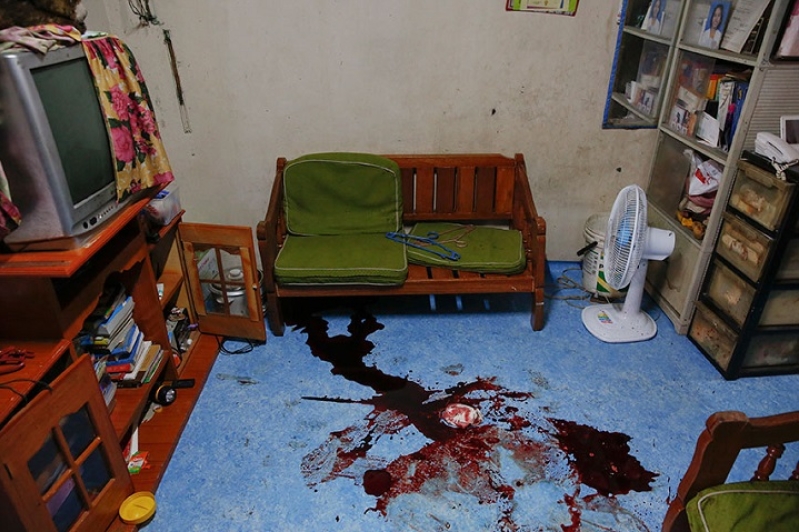
True to the campaign promise of Philippines Pres. Rodrigo Duterte that many “drug addicts” will die if he should get elected, more than 5,000 suspected drug dealers have been killed in the country in less than five months since he sat in office.
An estimated 2,000 of these were killed by the police. However, according to the police, most of these killings were a result of the victims fighting back and resisting arrest.
Now, various reports investigating these deaths have surfaced to paint a clearer picture of the president’s famous war on drugs, and some of them claim the police’s version of the stories are untrue.
Daniel Berehulak, photographer at The New York Times, recorded 57 people dead in his 35 days of stay in the Philippines. He said he had seen bloody scenes in front of 7-Eleven stores, in front of a school, in back alleys and on sidewalks.
“They are slaughtering us like animals,” a bystander told him. Berehulak documented the scenes in a report released on Wednesday.
Berehulak cited the case of 34-year-old Florjohn Cruz, who was killed inside his home by armed men. According to Cruz’s wife, the armed men entered the living room and shot Cruz, who was fixing a transistor radio for his mother.
However, police said Cruz and two other men were caught in a "buy-bust" operation. When he realized the men were police, he reportedly ran inside the house, grabbed a gun and fired at them.
“Suspect Cruz ran inside the house then pulled a firearm and successively shot the lawmen, prompting the same to return fire in order to prevent and repel Cruz’s unlawful aggression,” police reportedly said.
Cruz’s family, who claim he didn’t own a gun, is challenging the police report. They have requested a second autopsy to get more information.
They said the police men ordered Cruz’s mother out of the house. She heard him pleading, saying “there’s nothing here,” but his words were followed by gunshots.
Cruz was shot below the chin, at the abdomen and the heart.
“He’s just a normal human being who used to do drugs. It’s like they just killed a dog,” his niece said.
Berehulak said what he witnessed in the Philippines was like “a new level of ruthlessness: police officers’ summarily shooting anyone suspected of dealing or even using drugs, vigilantes’ taking seriously Mr. Duterte’s call to ‘slaughter them all.’”
Reuters reported a similar incident when men in plainclothes grabbed three men and pushed them into a marked police van. Eyewitnesses said the three men ran when they saw the police in the vicinity, but the police caught them, bound their hands behind their backs and took them away.
The sister of one of the men went looking for them at the police station but did not find them. Then, at around 2 a.m., neighbors told her they saw three bodies, and she knew at that instant that her brother was dead.
Her brother was so severely beaten that his face was unrecognizable. He had cigarette burns on the chest and hands, and he had deep cuts in different parts of his body. He and the two other men with him had sachets of methamphetamine on them.
Police reported that as they entered the community, the three men put up a fight and opened fire at them, necessitating that they fire back.
Ronald Dela Rosa, national police chief, said such killings are being investigated by the Internal Affairs Service. But with so many deaths per day, the IAS is overwhelmed with the investigations, its chief superintendent said.
“THE DRUG WAR IS SERIOUS. The drug war is not child’s play,” the Presidential Communications Office told Reuters when asked why almost none of the suspected drug dealers survive.
“Unfortunately, those who resist and fight back with arms have to be dealt with by tough law enforcement. Violent encounters do have the risk of the suspects being killed because they are armed in the first place,” the agency said in a statement, adding that in such cases, “the police have no recourse but to shoot back” or risk getting killed.
The agency also denied accusations that the suspected drug dealers die at the hands of the police.
“We decry the attribution of drug-related killings to the police,” the agency said. “Again and again, the President has reiterated that his adherence to due process and rule of law is uncompromising.”
Duterte recently claimed president-elect Trump, in a phone call, expressed his support for the drug war that has killed thousands of people. Trump also reportedly invited Duterte to the White House.
However, a statement from Trump’s camp did not confirm any of these. Instead, the statement focused on working together and recognizing “the long history of friendship and cooperation” between the U.S. and the Philippines.






